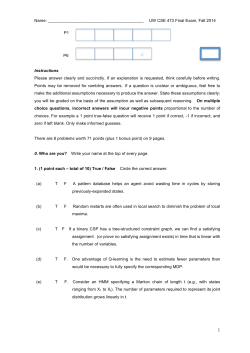
Superscalar Pipelines - Computer Architecture Stony Brook Lab
Spring 2015 :: CSE 502 – Computer Architecture Superscalar Organization Instructor: Nima Honarmand Spring 2015 :: CSE 502 – Computer Architecture Instruction-Level Parallelism (ILP) • Recall: “Parallelism is the number of independent tasks available” • ILP is a measure of inter-dependencies between insns. • Average ILP = num. instruction / num. cyc required code1: ILP = 1 i.e. must execute serially code2: ILP = 3 i.e. can execute at the same time code1: r1 r2 + 1 r3 r1 / 17 r4 r0 - r3 code2: r1 r2 + 1 r3 r9 / 17 r4 r0 - r10 Spring 2015 :: CSE 502 – Computer Architecture ILP != IPC • ILP usually assumes – Infinite resources – Perfect fetch – Unit-latency for all instructions • ILP is a property of the program dataflow • IPC is the “real” observed metric – How many insns. are executed per cycle • ILP is an upper-bound on the attainable IPC – Specific to a particular program Spring 2015 :: CSE 502 – Computer Architecture Purported Limits on ILP Weiss and Smith [1984] Sohi and Vajapeyam [1987] Tjaden and Flynn [1970] Tjaden and Flynn [1973] Uht [1986] Smith et al. [1989] Jouppi and Wall [1988] Johnson [1991] Acosta et al. [1986] Wedig [1982] Butler et al. [1991] Melvin and Patt [1991] Wall [1991] Kuck et al. [1972] Riseman and Foster [1972] Nicolau and Fisher [1984] 1.58 1.81 1.86 1.96 2.00 2.00 2.40 2.50 2.79 3.00 5.8 6 7 8 51 90 Spring 2015 :: CSE 502 – Computer Architecture ILP Limits of Scalar Pipelines (1) • Scalar upper bound on throughput – Limited to CPI >= 1 – Solution: superscalar pipelines with multiple insns at each stage Prefetch Decode1 U-pipe Pentium Pipeline V-pipe Decode2 Decode2 Execute Execute Writeback Writeback Spring 2015 :: CSE 502 – Computer Architecture ILP Limits of Scalar Pipelines (2) • Inefficient unified pipeline – Lower resource utilization and longer instruction latency – Solution: diversified pipelines IF • • • ID • • • RD • • • EX ALU MEM1 FP1 MEM2 FP2 FP3 WB • • • BR Spring 2015 :: CSE 502 – Computer Architecture ILP Limits of Scalar Pipelines (3) • Rigid pipeline stall policy – A stalled instruction stalls all newer instructions – Solution 1: out-of-order execution IF • • • ID • • • RD • • • ( in order ) Dispatch Buffer EX ALU ( out of order ) MEM1 FP1 MEM2 FP2 BR FP3 ( out of order ) Reorder Buffer WB ( in order ) • • • Spring 2015 :: CSE 502 – Computer Architecture ILP Limits of Scalar Pipelines (3) • Rigid pipeline stall policy – A stalled instruction stalls all newer instructions – Solution 1: out-of-order execution – Solution 2: interstage buffers Fetch Instruction Buffer In Program Order Decode Dispatch Buffer Dispatch Issuing Buffer Out of Order Execute Completion Buffer In Program Order Complete Store Buffer Retire Spring 2015 :: CSE 502 – Computer Architecture ILP Limits of Scalar Pipelines (4) • Instruction dependencies limit parallelism – Frequent stalls due to data and control dependencies – Solution 1: renaming – for WAR and WAW register dependences – Solution 2: speculation – for control dependences and memory dependences Spring 2015 :: CSE 502 – Computer Architecture ILP Limits of Scalar Pipelines (Summary) 1. Scalar upper bound on throughput – Limited to CPI >= 1 – Solution: superscalar pipelines with multiple insns at each stage 2. Inefficient unified pipeline – Lower resource utilization and longer instruction latency – Solution: diversified pipelines 3. Rigid pipeline stall policy – A stalled instruction stalls all newer instructions – Solution: out-of-order execution and inter-stage buffers 4. Instruction dependencies limit parallelism – Frequent stalls due to data and control dependencies – Solutions: renaming and speculation State of the art: Out-of-Order Superscalar Pipelines Spring 2015 :: CSE 502 – Computer Architecture Overall Picture • Fetch issues: – Fetch multiple isns – Branches – Branch target mis-alignment I-cache Branch Predictor • Decode issues: – Identify insns – Find dependences • Execution issues: – – – – – Out-of-order completion – Speculative instructions – Precise exceptions Instruction Buffer Instruction Flow DECODE Integer Dispatch insns Resolve dependences Bypass networks Multiple outstanding memory accesses Register • Completion issues: FETCH Data Flow Floating-point Media Memory Memory Data Flow EXECUTE Reorder Buffer (ROB) Store Queue COMMIT D-cache State of the art: Out-of-Order Superscalar Pipelines
© Copyright 2025









